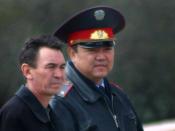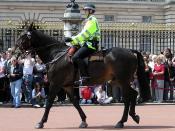Deliberation and Moral Problems in Training
I. INTRODUCTION
First part of the chapter the author discusses situations that might need deliberation..or the situation has options of how it should be handled - the author asks practical questions and offers some suggestions on how to handle them
He states that the action to take in a given situation sometimes does not require much thought - it is natural if the person has morals. (Standards of behavior - principals of right and wrong)
Not every situation requires deliberation - some situations require quick fast decisions which should be guided by ones everyday conduct -
Example: the author equates this as you don't have to think about whether you will behave honestly towards your family and friends - just as you don't have to think about brushing your teeth
II. MORAL DELIBERATIONS
Author tries to make the distinction between the "truth" and being "honest"
⸠Questions arise sometimes for officers because they don't want to lie about the truth, but sometimes telling the truth might divulge confidential information.
Situations often arise where there might have to be exceptions to where a police officer does not tell the truth
Example: A murder asks you which way a man has gone, and you tell him something that is not true, because you are under a previous obligation not to betray a man to a murder
The author presents eight situations as problematic where some type of conclusion should be reached using a form of moral deliberations. I will discuss three of them:
Question: News reporters ask in an interview for information about an investigation that is confidential. Should police lie to protect confidentiality? (Lying to the media)
Reporter asking for sensitive information about an investigation or victim, has no right to it; the police have...


